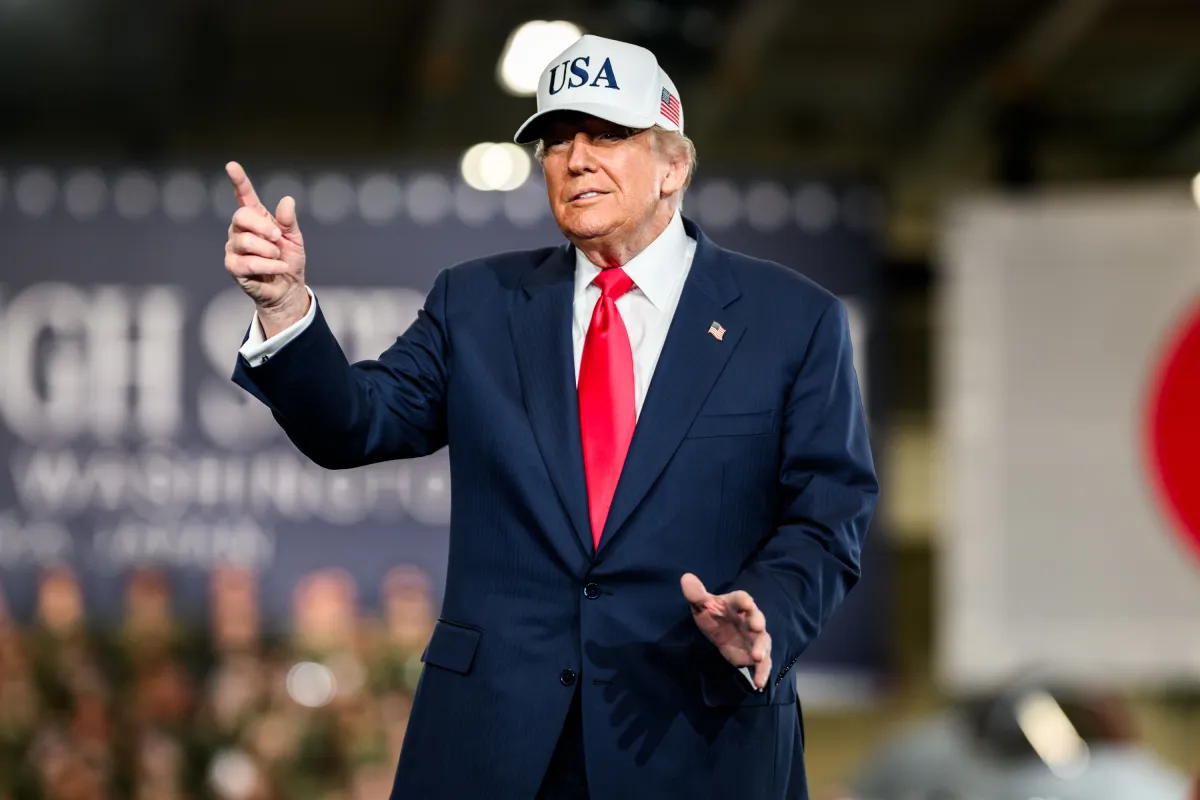NOTE: Video embedded throughout the article.
During a visit to U.S. forces abroad, President Donald Trump announced plans to increase pay across the U.S. Armed Forces, drawing widespread applause from service members. The announcement came as part of a broader overseas tour aimed at strengthening international alliances and emphasizing the administration’s priorities for national defense.
Trump’s Visit and Speech
The president delivered his remarks aboard the USS George Washington aircraft carrier in Yokosuka, Japan, where he was visiting Japanese Prime Minister Sanae Takaichi. In a speech centered on the administration’s “Peace Through Strength” policy, Trump expressed gratitude to the military and highlighted several initiatives aimed at boosting the readiness and morale of U.S. forces.
“I’m also supporting an across-the-board pay raise for every sailor and service member in the United States Armed Forces,” Trump said, prompting sustained applause from the assembled servicemen and women. The president underscored the importance of ensuring that all personnel are compensated fairly for their service, emphasizing that funding decisions would require congressional approval.
Trump noted that while legislative action from Congress is necessary to enact the pay increase, he expressed confidence that lawmakers would support the proposal.
Focus on Military Readiness
Throughout his remarks, Trump emphasized a return to meritocracy within the armed forces and a focus on operational readiness. He criticized policies he said had prioritized identity-based initiatives over military efficiency, stating that the administration was committed to strengthening the armed forces without political compromise.
“When it comes to defending the United States, we’re no longer politically correct,” Trump said. “We’re going to defend our country any way we have to.” He further stated, “From now on, if we’re in a war, we’re going to win the war. We’re going to win it like nobody ever before.”
These statements reflect the administration’s ongoing emphasis on military preparedness and the perceived need to remove policies or practices that could hinder operational effectiveness.
Reinforcing U.S. Alliances
Trump’s visit to Japan also highlighted the strategic partnership between the two countries. Japanese Prime Minister Sanae Takaichi, a conservative leader with a political style often compared to Trump’s, welcomed the president aboard the aircraft carrier and emphasized shared commitments to regional security and deterrence.
The president used the platform to reaffirm the United States’ dedication to maintaining a robust defense posture in the Asia-Pacific region. His comments stressed both a commitment to alliances and a willingness to pursue policies to ensure U.S. military dominance and global influence.
Historical and Symbolic References
During his speech, Trump invoked historical symbolism, drawing a connection between the ship and the nation’s founding principles. “For two-and-a-half centuries, America’s Navy preserved the vision of our first commander-in-chief, who gave this ship its storied name, its righteous soul, and its timeless model: ‘First in war, first in peace,’” he said, referencing George Washington. These remarks framed the president’s defense initiatives within a broader historical context, emphasizing continuity between past and present military excellence.
Pay Raises and Congressional Approval
The proposed pay increases, while broadly supported by the military community, still require legislative approval. Trump highlighted the need for collaboration with Congress, noting that bipartisan support would be essential to secure the funding necessary for an across-the-board raise.
By placing troop compensation at the forefront of his overseas visit, the administration signals a commitment to improving morale and retention within the ranks. Analysts suggest that such moves are likely to resonate positively with service members, while also reinforcing the administration’s broader messaging on national security priorities.
Reaction From Troops
The audience aboard the aircraft carrier responded enthusiastically to Trump’s announcement. Many service members expressed appreciation for the administration’s attention to pay and operational readiness. While individual reactions were varied, the overall reception underscored a positive morale boost among personnel present.
Observers note that public appearances such as this one serve both symbolic and practical functions. They allow military leadership to hear directly from the commander-in-chief, while simultaneously demonstrating to the public a visible commitment to national defense.
Broader Defense Policy Context
Trump’s remarks also included commentary on prior defense initiatives. He referenced efforts to revise military policies that, according to him, detracted from core operational objectives. His administration has sought to limit programs or requirements perceived as prioritizing social initiatives over merit, arguing that military effectiveness must remain paramount.
This focus on readiness and efficiency reflects longstanding debates within U.S. defense policy regarding the balance between personnel management, social policies, and operational preparedness. While critics argue that some measures may limit inclusivity, proponents maintain that an uncompromising emphasis on readiness strengthens the armed forces overall.
Commitment to American Exceptionalism
Toward the conclusion of his remarks, Trump emphasized themes of American exceptionalism and leadership on the global stage. He framed both the pay raise and readiness initiatives as part of a broader effort to restore and maintain the United States’ position as a dominant military power.
“For two-and-a-half centuries, America’s Navy has preserved the vision of our first commander-in-chief,” he said, drawing connections between the founding era and contemporary policy decisions. Trump positioned the administration’s initiatives as a continuation of historical principles, emphasizing both honor and duty.
Implications and Next Steps
While the pay increase announcement was met with applause, its implementation is contingent upon congressional approval. Lawmakers in both parties will consider the proposal, weighing fiscal priorities, defense needs, and broader budgetary considerations.
Observers suggest that positioning the announcement during an overseas visit amplifies its political and symbolic significance. It reinforces the administration’s stated priorities while providing an opportunity to demonstrate leadership and commitment to U.S. service members in a highly visible setting.
The announcement may also influence ongoing debates regarding defense policy, personnel management, and military funding, highlighting the administration’s focus on morale, efficiency, and readiness.
Conclusion
President Trump’s address aboard the USS George Washington emphasized both material support for the military through proposed pay raises and a broader strategic focus on readiness, merit, and operational effectiveness. His remarks were well-received by service members and positioned the administration’s defense priorities within a historical and global context.
As Congress considers the proposed pay increases, the announcement serves as a reminder of the administration’s commitment to strengthening the armed forces while highlighting ongoing debates over policy, operational priorities, and the balance between social initiatives and military effectiveness.

Emily Johnson is a critically acclaimed essayist and novelist known for her thought-provoking works centered on feminism, women’s rights, and modern relationships. Born and raised in Portland, Oregon, Emily grew up with a deep love of books, often spending her afternoons at her local library. She went on to study literature and gender studies at UCLA, where she became deeply involved in activism and began publishing essays in campus journals. Her debut essay collection, Voices Unbound, struck a chord with readers nationwide for its fearless exploration of gender dynamics, identity, and the challenges faced by women in contemporary society. Emily later transitioned into fiction, writing novels that balance compelling storytelling with social commentary. Her protagonists are often strong, multidimensional women navigating love, ambition, and the struggles of everyday life, making her a favorite among readers who crave authentic, relatable narratives. Critics praise her ability to merge personal intimacy with universal themes. Off the page, Emily is an advocate for women in publishing, leading workshops that encourage young female writers to embrace their voices. She lives in Seattle with her partner and two rescue cats, where she continues to write, teach, and inspire a new generation of storytellers.









